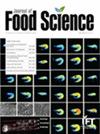Comparison between the sodium chloride content and labeled salt value of industrially prepared Japanese single dishes
Abstract
Salt intake reduction is a global concern. In particular, Japanese consume higher amounts of salt than those of other ethnicities. The sodium content is mentioned on the label of industrially prepared dishes with an intention of reducing salt intake. This study aimed to evaluate the difference between the actual sodium content and labeled salt value of industrially prepared Japanese single dishes. Samples labeled “estimated” were collected and classified as Japanese, Western, and Chinese cuisines. The sodium content ranged from 180 to 1011 mg/100 g. The sodium content was higher than their reported values in other countries. Specifically, Chinese dishes contained high amounts of sodium, although the chloride content was similar across cuisine styles. Further, the molar ratio (i.e., sodium/chloride) had no significant effect on the difference between the actual content and labeled value. The measured salt contents were 20% higher than the labeled values. The results of decision tree analysis indicated that if the labeled salt value of stir-fried foods is determined by calculation, the actual sodium content is much higher than the labeled salt value. These findings are crucial for customers, dietitian, and researchers as they refer to the labeled salt value to determine the sodium content of industrially prepared foods.

| 公司名称 | 产品信息 | 采购帮参考价格 |
|---|
 求助内容:
求助内容: 应助结果提醒方式:
应助结果提醒方式:


